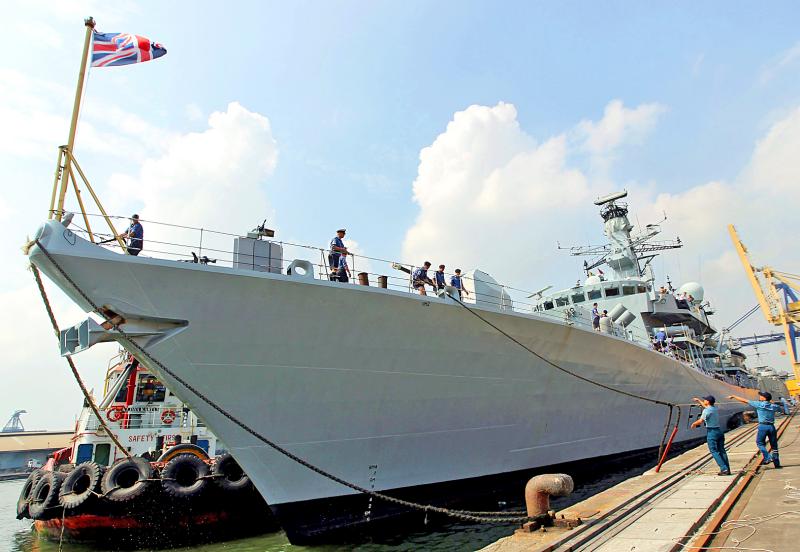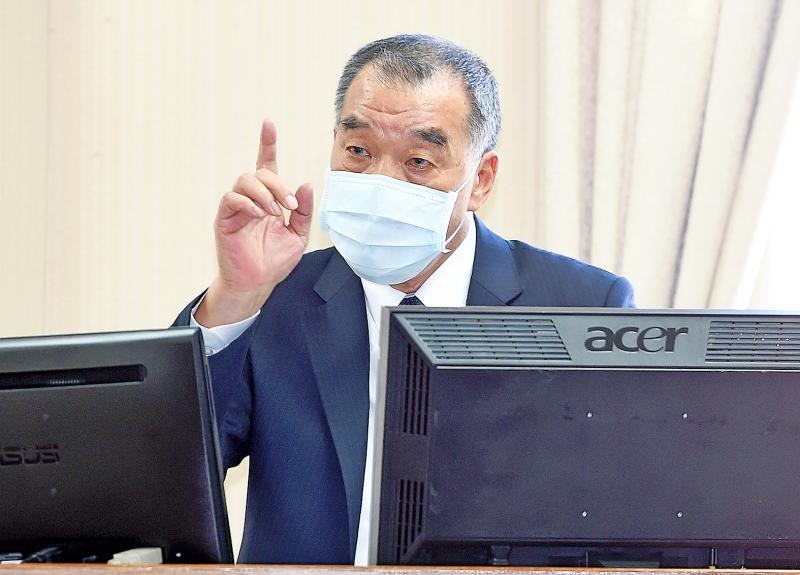British warship the HMS Richmond passed through the Taiwan Strait yesterday morning, according to a social media post from the frigate.
“After a busy period working with partners and allies in the East China Sea, we are now en route through the Taiwan Strait to visit Vietnam and the Vietnam People’s Navy,” the message on Twitter said.
The type 23 Royal Navy frigate is one of the ships deployed with the HMS Queen Elizabeth aircraft carrier and her task group on a global mission to visit more than 40 nations.

Photo: EPA
The aircraft carrier and task group earlier this month made a port call in Yokohama, Japan.
The British embassy in Tokyo said at the time that the deployment was “a powerful demonstration of the UK’s close and enduring partnership with Japan and the UK’s commitment to maritime security in the Indo-Pacific region.”
The passage through the Taiwan Strait came a week after British First Sea Lord Admiral Tony Radakin told Nikkei Asia that the Taiwan Strait is “international waters” and it can be used by any nation, not just by China.

Photo: Liao Chen-huei, Taipei Times
Minister of National Defense Minister Chiu Kuo-cheng (邱國正) said in Taipei that he was not aware of the exact mission of the British warship that was passing through the Taiwan Strait, but that the armed forces have a clear grasp of all foreign vessels operating near Taiwan and would not intervene.
In related news, Chiu yesterday told a meeting of the Foreign Affairs and National Defense Committee at the legislature that Taiwan needs long-range, accurate weapons to properly deter a China that is rapidly developing systems it could use to attack the nation.
The government this month proposed extra defense spending of almost US$9 billion over the next five years, including on new missiles, as it warned of an urgent need to upgrade the nation’s weapons in the face of a “severe threat” from China.
Taiwan needs to let China know that it can defend itself, Chiu said.
“The missiles must be long-range, precise and mobile, so that the enemy can sense that we are prepared as soon as they dispatch their troops,” he said.
In a written report to the legislature, the ministry said that both medium and long-range missiles were being used in intercept drills at a key testing facility on the southeastern coast.
Chiu declined to give details of the range of those missiles.
The ministry gave an unusually stark assessment of China’s abilities in its annual report, saying it could “paralyze” Taiwan’s defenses and is able to fully monitor its deployments.
It is important that Taiwanese are aware of the danger facing them, Chiu said.
Asked what China would attack first in the event of a war, Chiu said that it would be Taiwan’s command and communications abilities.
“On this the Chinese communists’ abilities have rapidly increased. They can disrupt our command, control, communications and intelligence systems, for example with fixed radar stations certainly the first to be attacked,” he said. “So we must be mobile and stealthy.”

MAKING WAVES: China’s maritime militia could become a nontraditional threat in war, clogging up shipping lanes to prevent US or Japanese intervention, a report said About 1,900 Chinese ships flying flags of convenience and fishing vessels that participated in China’s military exercises around Taiwan last month and in January last year have been listed for monitoring, Coast Guard Administration (CGA) Deputy Director-General Hsieh Ching-chin (謝慶欽) said yesterday. Following amendments to the Commercial Port Act (商港法) and the Law of Ships (船舶法) last month, the CGA can designate possible berthing areas or deny ports of call for vessels suspected of loitering around areas where undersea cables can be accessed, Oceans Affairs Council Minister Kuan Bi-ling (管碧玲) said. The list of suspected ships, originally 300, had risen to about

DAREDEVIL: Honnold said it had always been a dream of his to climb Taipei 101, while a Netflix producer said the skyscraper was ‘a real icon of this country’ US climber Alex Honnold yesterday took on Taiwan’s tallest building, becoming the first person to scale Taipei 101 without a rope, harness or safety net. Hundreds of spectators gathered at the base of the 101-story skyscraper to watch Honnold, 40, embark on his daredevil feat, which was also broadcast live on Netflix. Dressed in a red T-shirt and yellow custom-made climbing shoes, Honnold swiftly moved up the southeast face of the glass and steel building. At one point, he stepped onto a platform midway up to wave down at fans and onlookers who were taking photos. People watching from inside

Japan’s strategic alliance with the US would collapse if Tokyo were to turn away from a conflict in Taiwan, Japanese Prime Minister Sanae Takaichi said yesterday, but distanced herself from previous comments that suggested a possible military response in such an event. Takaichi expressed her latest views on a nationally broadcast TV program late on Monday, where an opposition party leader criticized her for igniting tensions with China with the earlier remarks. Ties between Japan and China have sunk to the worst level in years after Takaichi said in November that a hypothetical Chinese attack on Taiwan could bring about a Japanese

STREAMLINED: The dedicated funding would allow the US to transfer equipment to Taiwan when needed and order upgraded replacements for stockpiles, a source said The US House of Representatives on Thursday passed a defense appropriations bill totaling US$838.7 billion, of which US$1 billion is to be allocated to reinforcing security cooperation with Taiwan and US$150 million to replace defense articles provided to the nation. These are part of the Consolidated Appropriation Act, which the US House yesterday passed with 341 votes in favor and 88 against. The act must be passed by the US Senate before Friday next week to avoid another government shutdown. The US House Committee on Appropriations on Monday unveiled the act, saying that it allocates US$1 billion for the Taiwan Security Cooperation Initiative